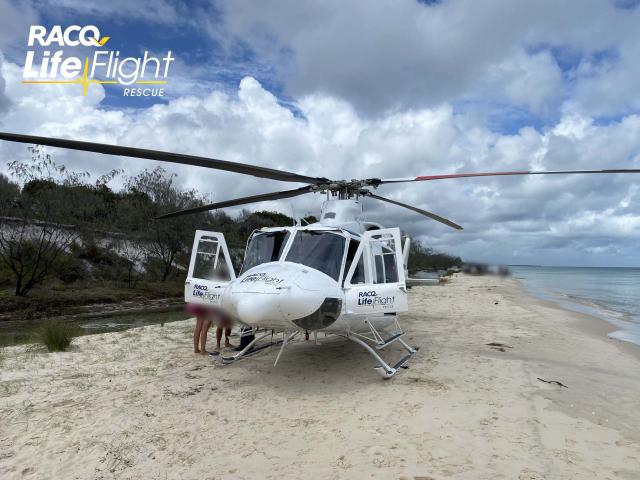RACQ LifeFlight Rescue helicopter crews airlifted a young girl to hospital, after she was stung by an unknown jellyfish on K’Gari (Fraser Island) on Sunday morning, then returned on Monday for a man aged in his 20s and again two hours later for an infant girl, both believed to have been stung by Irukandji jellyfish.
In all three cases the rescue chopper was tasked to the western side of the island.
Queensland Ambulance Service also transported a young boy from K’gari to the Gympie Hospital for treatment after a suspected Irukandji sting and he was later released from hospital.
It’s believed the young girl was on a camping holiday with her family when the RACQ LifeFlight Critical Care doctor treated her about 10am on Sunday for an allergic reaction to a sting from a jellyfish of an unknown type and she was flown to Hervey Bay Hospital in a stable condition.
On Monday, a helicopter crew was tasked to the island about 1pm, where LifeFlight’s critical care doctor treated the man and he was flown to Hervey Bay Hospital in a stable condition.
The crew returned to the same location just two hours later, working alongside the aeromedical team from local Queensland Ambulance Service (QAS) paramedics to treat the infant girl who was flown to Hervey Bay Hospital in a stable condition accompanied by a parent.
Irukandji jellyfish are not new to the island with reports of stings having been made for decades.
ABC reports Griffith University marine ecologist Professor Kylie Pitt said they knew Irukandji were produced up in North Queensland and it may well be that these individuals are catching a ride down on the current as adults.
“We certainly know that [Irukandji] have been around K’gari for quite a long time, but we also have a lot more people in the water these days than what we used to, so the likelihood of being stung has also increased,” she said.
QAS reports the Irukandji jellyfish is a small, extremely venomous species of box jellyfish approximately two centimetres in diameter, making it difficult for swimmers to notice in the water.
Signs and symptoms of Irukandji envenomation may appear 5 to 45 minutes after the initial sting and include severe backache or headache, shooting pains in muscles, chest and abdomen, nausea, anxiety, restlessness, vomiting and breathing difficulties
QAS advise to manage Irukandji jellyfish stings:
– Call Triple Zero for an ambulance immediately
– carefully remove the casualty from the water
– avoid rubbing the sting area
– immediately douse the sting area with vinegar for at least 30 seconds. If vinegar is not available, carefully remove tentacles off the skin and rinse well with seawater
– regularly monitor and record the casualty’s pulse, breathing and conscious level
– begin resuscitation if necessary.








